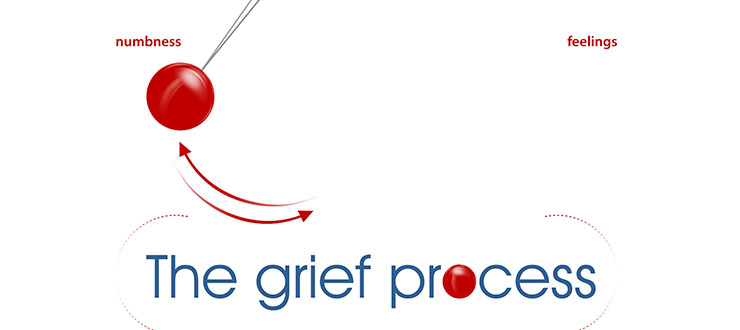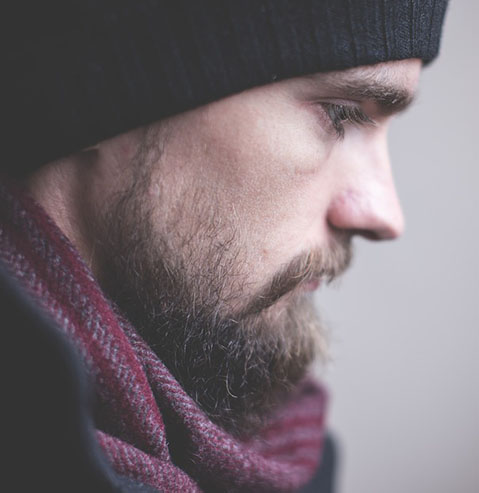
The grief process is like a pendulum. Sometimes we swing toward feelings of anger, sadness and anxiety. Sometimes we swing away from those feelings toward numbness or denial. Eventually, the back-and-forth of the grief experience allows us to process our feelings and thoughts about the loss.
A job loss, a divorce, the death of a loved one, a life-changing diagnosis – we all experience loss in our lives, and grief is a normal response to that loss.
What is grief?
Grief is a natural process that can take from a few days to many years to move through. Some aspects of the loss might never go away.
While there are many different ways to explain the process of grief, most models describe grief like pendulum. At times, we swing towards our feelings of anger, sadness and anxiety that comes with our loss. At other times, we swing away from our feelings of grief and feel numb or detached from our feelings and our environment. At times, we may even feel as though the loss isn’t real.
All expressions of grief are important. We need to feel our feelings, but we also need some recovery time from the intensity of our feelings.
With time, the back-and-forth of the grief experience allows us to process our feelings and thoughts about the loss. With time, we try to create a new understanding of life that incorporates both the loss and the new experience of life moving forward. This allows us to create new connections in our future, while still honouring the past.
Objective vs. symbolic loss

An ‘objective’ loss is any tangible loss, such as the death of a loved one. A ‘symbolic’ loss is a less tangible loss. It can be a loss of an ideal, such as ending a relationship that wasn’t working out, moving to a new city, or changing jobs.
We can feel grief for both kinds of losses. It is common to grieve both for what we have actually lost and for the hopes and dreams we had before the loss.
An objective loss can also trigger symbolic losses. For example, the death of a spouse (objective loss) can trigger the loss of your role as a partner (symbolic loss).
Why do we grieve?
When we grieve, we try to make sense of a loss.
When we experience a loss, the loss may challenge the expectations or beliefs we held about the world before we felt the loss. For example, we may start questioning if we still believe that good things happen to good people, whether we can trust others or whether the world is a safe place.
The goal of grief is to re-adjust to our new environment with this loss, and to try to make sense of our beliefs in the new environment. With time, grief can help us to shift or re-establish our sense of purpose in the world, and we move forward with both old and new relationships.
What are the signs of grief?
Everyone experiences grief differently. Here are some common signs of grief:
| Emotional signs of grief | Physical signs of grief |
| Sadness | Weight loss |
| Depression | Insomnia |
| Loneliness | Fatigue |
| Hopelessness | A “lump” in your throat |
| Anxiety | Chest tightness |
| Anger | Hollowness in the stomach |
| Guilt | A feeling of being physically separated from your environment |
| Self-blame or blame for others | Physical symptoms that can’t be explained |
| Yearning for the return of what we have lost | More frequent illnesses |
| Relief from the loss | |
| Relief from the loss with guilt |
| Behavioural and social signs of grief | Thought-centred signs of grief |
| Difficulty performing other roles (e.g. work) | Denial |
| Isolation from others | Confusion |
| Sleep difficulties | Preoccupation with the loss |
| Change in appetite | Hearing the voice or seeing their face of a loved one |
| Avoidance of things, people or places that remind us of the loss | Lowered self-esteem |
| Frequent sighing | |
| Restlessness |
Remember: The intensity of every sign can change, and last from days to years.
How long does it take to grieve?

There is no set timeline for grief. Similar to a physical injury, grief is an emotional injury that needs time to heal. We may feel grief for a few days to many years. Some aspects of our grief can stay with us for our lifetime. There may always be moments when we continue to miss what we have lost.
For some people, keeping busy helps. For others, working, taking care of other family members or having other responsibilities delays our own grief process.
Expressing grief around others
Well-meaning people may say things like, ‘pull yourself together!’ or ‘you are strong; you look good!’ They may not understand grief, or perhaps they feel uncomfortable with grief and don’t know what else to say.
The reactions of others may influence for how long we show our grief to them. Many people may not show grief on the outside, but they may very well still feel it on the inside. Try to give yourself permission to take the time you need and to express your grief to a safe and compassionate person.
How can I work through grief?
Grieving is an active process. It takes effort and time. Here are four grief ‘tasks’ that can help give you a framework to work with your grief. The tasks can be done in any order, and people who are grieving can switch back and forth between them in a way that makes the most sense to them.
- Accept the reality of the loss
We gradually acknowledge what has been lost, turning ourselves towards our new reality.
- Process grief and pain
It’s ok to feel grief and pain, even when others are telling us to deny our feelings and ‘get over it.’ We can work through our feelings by naming them, examining the thoughts that go with them and connecting with supportive people to talk about loss.
- Adjust to the world with the loss
Grief often includes adjusting to our new reality. We may need to take on new or different roles such as managing finances and doing different household chores.
We may also adjust how we see ourselves and how we make sense of the world. Think about how the loss affects your beliefs, values and assumptions about the world.
Ask yourself: ‘Who am I now?’ ‘What is important to me?’ ‘What do I value?’ ‘Have I lost trust in people or the world?’
- Find a connection with the loss while starting your new journey
Grief is not about forgetting the loss, but rather about incorporating our experience of loss into our lives
Overall, try to keep up your self care as much as you can. Are there activities, memories or items that you want to incorporate into your life?

When someone dies, you might decide to spend time thinking about them and looking at pictures. This might happen when you feel yourself missing the person, or it might be a ritual you create on grief anniversaries (special dates such as birthdays and holidays).
Grief can intensify on these days. In general, deciding how you will spend some of your time – while giving yourself permission to change your mind – and checking in with yourself can help manage the pendulum of grief.
If the grief is a result of a shift in your life such as the end of a relationship or a move, you might decide to make sure to schedule activities that are important to you.
When should I get help for grief?
Anyone can reach out for help during any part of their grief process, but certainly consider talking to a doctor, mental health practitioner, or spiritual leader if you:
- have no feelings of grief, even though the loss was important to you
- feel unrelenting social isolation
- have grief symptoms that remain intense and, after several months, you aren’t able to engage in other aspects of your life (e.g. working, parenting)
Grief is a difficult but inevitable part of life. If you are grieving, you are not alone. If you are struggling with grief, reach out.
Resources
- 24/7 Distress Line: 613-238-3311
- Mental Health Crisis Line: within Ottawa 613-722-6914 or surrounding areas 1-866-966-0991
- Ontario Mental Health Hotline 1-866-531-2600
- Walk-in counselling clinics
- ConnexOntario or 1-866-531-2600

Support patient care and research at
The Ottawa Hospital
You might also like…
Aging well: Guidance for older adults
In this special video series for both older adults and their loved ones, geriatric care specialists from The Ottawa Hospital offer guidance on navigating common health-care challenges that may arise with aging.
How to stay safe around water this summer
Drowning can happen to anyone — even strong swimmers. Emergency physician Dr. Christian Vaillancourt debunks common myths about drowning, explains how to act quickly to save a life, and shares what you can do to keep yourself and your loved ones safe around water.
What’s the difference between an optician, optometrist, orthoptist and ophthalmologist?
“Do I need to see an optician, optometrist, orthoptist or ophthalmologist?” We asked Ophthalmologist Dr. Annick Fournier to break down each role so you will know who to consult for your specific eye care needs.
Understanding rabies: Risks, vaccination and what to do after a bite
Although rare in Canada, rabies is almost always fatal once symptoms appear. Infectious diseases expert Dr. Michaeline McGuinty shares how rabies is spread, when to get vaccinated and what to do after a bite.
“My story doesn’t have to be your story”: New screening test better at preventing cervical cancer
“I went from being a 32-year-old new mom to a cancer patient with an incurable diagnosis.” Alicia’s journey underscores the critical role of HPV testing in preventing cervical cancer. Discover how the new HPV test can save lives and find out how to book your cervical screening appointment with our “Superscreener.”
Sign language interpretation services at The Ottawa Hospital: 5 FAQs
Do you require a sign language interpreter when you come to The Ottawa Hospital? For patients who are Deaf or hard of hearing, we provide both American Sign Language (ASL) and Langue des Signes Québécoise (LSQ) interpretation services at no cost. Before your next appointment with us, find out everything you need to know.


 To reset, hold the Ctrl key, then press 0.
To reset, hold the Ctrl key, then press 0.





